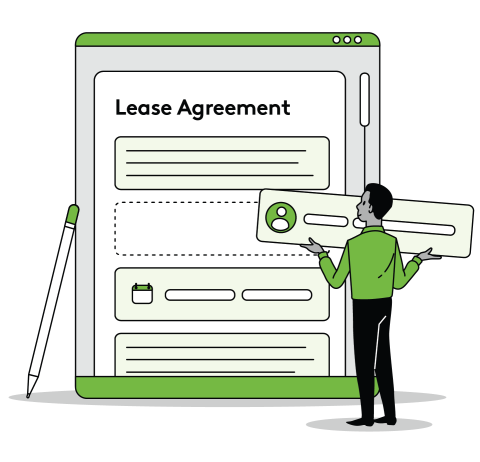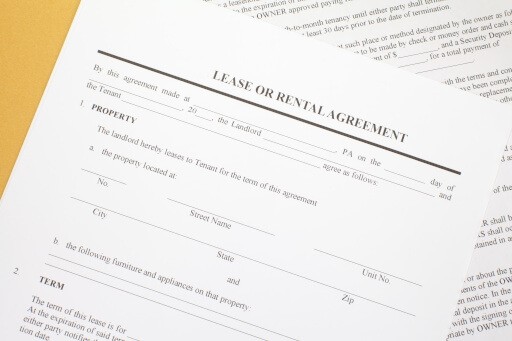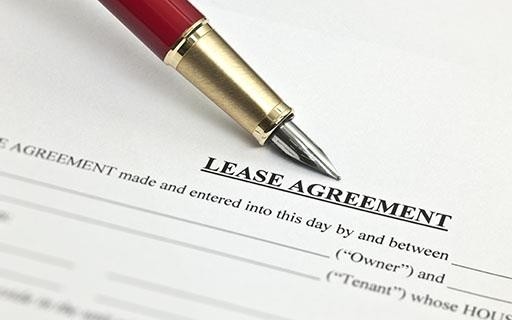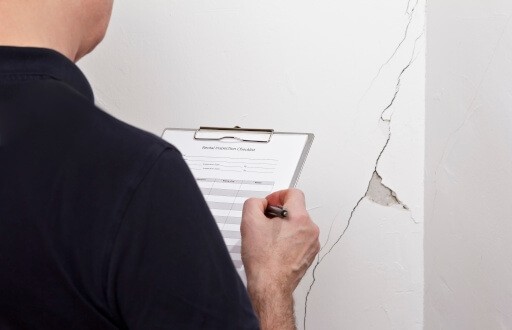
Today’s landlords can shoot a text to a tenant at any given moment. However, when it comes to significant matters about their lease, it’s best to formalize communication with a letter.
The times when you should send your tenant a formal letter, whether digitally or in the mail, are when it’s time to renew a lease, move out, and provide notice to pay rent or quit. In this guide, we’ll explain why written correspondence is needed for these situations, what to include in your letter, and tips for effective communication with tenants. Let’s get started!
Key Takeaways:
- Lease renewal letters should be sent 90 days before lease expiration, giving tenants ample time to respond, with a 30–60 day notice deadline for their decision.
- Move-out notices act as a checklist and should be sent about a month before the lease ends, clearly outlining cleaning, removal, and key return expectations to secure a full deposit refund.
- Pay or quit notices are legally sensitive and must include specific amounts owed, a payment deadline (typically 3 days), and consequences for non-payment, which may include legal action.
- Written tenant letters offer legal protection and should be professionally worded, detail-rich, and compliant with local laws to avoid miscommunication or disputes.
- Common landlord errors include using outdated templates, being vague or aggressive, and failing to confirm delivery, all of which can lead to tenant confusion or legal challenges.
Types of Tenant Letters Every Landlord Should Know
Right off the bat, let’s discuss what a lease renewal, move-out, and notice to pay letter means for you and your tenant. Then, we’ll provide some tips on how to write your letter, along with a free letter template to get you started!
Lease renewal letter
A lease renewal letter alerts your tenant that their lease will soon expire and offers them the option to renew for another term. Most landlords send a renewal letter 90 days before a lease expires, giving the tenant ample time to plan their next move. Then, after a month or so has passed, it’s common to ask for a non-renewal notice, which is a formal statement from the tenant indicating whether they plan to renew or not.
A lease renewal letter should include several key components, including the lease reference, new terms, monthly rent, response deadlines, and other relevant instructions. To ensure your letter covers all these bases, download our Lease Renewal Letter Template or follow the example below.
Dear [Tenant's Name],
This letter concerns your current lease for [Property address], which expires on [End date of current lease]. I'm offering you the option to renew your lease.
If you choose to renew, the new lease term will run from [Start date of new lease] to [End date of new lease]. The monthly rent will be [Monthly rent], and the lease terms will largely remain the same.
Please notify me of your decision to renew or vacate by [Date, typically 30-60 days before the lease ends]. If I do not hear from you by this date, I will assume you do not wish to renew.
For any questions or further details, please contact me at [Your contact information]. I appreciate your prompt response.
Sincerely,
[Landlord’s Name]
Move-out notice
If your tenant does not renew their lease, you’ll have to send a move-out notice leading up to their departure. Typically, this letter is sent about a month prior to the tenant’s move-out date and essentially acts as a move-out checklist for them. Here, you can outline specific instructions and requests, such as asking tenants to remove all personal belongings or clean all appliances, as long as they align with your lease agreement requirements.
To get you started on your move-out letter, download our Move-Out Letter Template or check out the example below.
Dear [Tenant's name],
Thank you for your tenancy at my [insert type of property, e.g., apartment or house] for the past [length of time].
This letter outlines your move-out procedures. Please remove all personal belongings by your lease end date, [end-of-lease date]. If you plan to vacate earlier, please inform me. Any personal property or garbage left on the premises after this date will be considered abandoned, and you will be responsible for removal costs.
As per your lease agreement, the unit must be left in a clean and undamaged condition. Your security deposit will be returned in full upon fulfilling these conditions.
Specifically, please ensure the following:
- Remove all food, debris, and personal belongings.
- Clean the refrigerator (including defrosting, if necessary).
- Clean the stove, oven, and any other appliances.
- Replace any burned-out light bulbs.
- Clean all floors and vacuum carpeting.
- Report any damage in writing.
- [include any other expectations]
Upon vacating, please secure the property by locking all windows and doors. Leave all keys at [state where you want these left].
After you move out, the rental will be inspected and photographed for compliance with your lease terms. Costs for cleaning beyond normal wear and tear or for damage repair will be deducted from your security deposit. You will be notified of any such charges. Please provide a forwarding address for your security deposit return.
It has been a pleasure having you as a resident, and I wish you the best in your new home.
Sincerely,
[Landlord's Name]
Notice to pay rent or quit
If your tenant stops paying rent, you’ll have to send them a formal notice to pay rent or quit. Although requirements may vary from state to state, most legislatures allow up to about 3-10 days to pay outstanding rent. If a tenant misses this grace period, that is when you should send a letter requesting that they either pay their dues or move out.
Download our Late Rent Notice Template or check out the example below.
Dear [Tenant’s Name],
This is a formal notice that your rent payment for the property at [address of the rental property], which you currently occupy, is overdue. Your account is delinquent as follows:
- Rental period: [list the month(s) with overdue rent]
- Total late fees: [list the amount]
- Total rent due: [list the amount]
According to the lease agreement starting on [lease start date] and ending on [lease end date], you are required to either pay the overdue rent in full or surrender possession of the property within [number of days] days of receiving this notice. Failure to comply will result in legal action to terminate the lease and recover possession of the property, along with any owed rent and damages.
The property in question is located at:
[Property address]
For any questions or to resolve this matter, please contact me at:
[Your name, address, phone number, and email]
Sincerely,
[Landlord’s Name]
Tips for Writing a Tenant Letter
Unlike a casual text or phone call, a formal tenant letter should be professional and detailed. To help you adopt this formal communication style, here are some tips for writing an effective tenant letter:
Maintain a clear, professional tone
As just mentioned, writing a tenant letter requires clear, detailed, and professional language. Avoid using slang, informalities, and any verbiage that could weaken the credibility of your message. Keep your tone respectful and polite, but also assertive to enforce your expectations.
Include relevant details
Details are key to writing tenant letters. If there are any important dates, deadlines, fees, or other necessary information related to the matter at hand, make sure to mention them in the letter. For example, when writing a notice to pay rent or quit, include the amount owed, due date, and any late fees. This ensures that the tenant is fully informed and can take appropriate action.
Find a balance of legal phrasing vs. casual tone
While your letter should be professional and detailed, you don’t want to overwhelm tenants with legal jargon. Use clear and concise language that is easy for tenants to understand. It’s important to maintain professionalism without making the letter feel too stiff or impersonal. The key is to use a casual tone to address the tenant while still maintaining a level of respect and authority.
Tenant Letter Requirements (Laws and Best Practices)
Legal compliance is key when writing a tenant letter. However, to ensure your letter aligns with local laws, you must do some legwork. From reviewing your state’s specific legal parameters to keeping strict documentation, here are some best practices for creating a legally sound tenant letter:
Understand state and local legal notice requirements
Lease renewal, move-out, and late rent guidelines can vary among states. So, it’s important to do your research before you get writing. Understand state-specific details like grace periods for late rent and tenant move-out procedures to avoid legal issues or tenant complaints.
Keep detailed records
When dealing with tenant matters, always keep detailed records to protect yourself should any issues arise. For example, if you are sending a lease renewal notice, make sure to have documentation showing when it was sent and received by the tenant. This will come in handy if there are any disputes about the timing of the notice.
Common Mistakes to Avoid when Writing Tenant Letters
If you’re a first-time landlord, it helps to be aware of common tenant letter mistakes. From forgetting to follow up on delivery to failing to proofread, here are some common errors to avoid when drafting a letter to your tenant:
Being too vague or aggressive
When writing a tenant letter, it’s important to strike the right tone. Being too vague can lead to misunderstandings and unnecessary confusion, while being too aggressive can cause tension and damage your relationship with your tenant. It’s important to be clear, direct, and professional in your communication.
Using an incorrect or outdated template
If you’re going to use a template to write your letter, ensure it’s up to date and aligned with your state guidelines. Using an incorrect or outdated template could cause you to forget critical information or include irrelevant clauses, which could confuse or mislead tenants. It's always best to double-check and make sure your template is accurate and current before sending out any formal notices.
If you’re looking for compliant, up-to-date tenant letter templates, check out our comprehensive Download Library. There, you’ll find free landlord forms, templates, and guides for each step of the property management cycle.
Forgetting to follow up on delivery
Once you’ve sent your tenant letter, it’s important to follow up and make sure they received it. This is especially crucial when dealing with urgent matters that require a tenant’s response, such as providing a notice to vacate or making late rent payments. You can follow up with a phone call, email, or even a hand-delivered copy of the letter. This not only ensures that your tenant is aware of the information in the letter but also serves as proof that you have made an effort to communicate with them.
Master Property Management with Apartments.com
Writing a tenant letter can be harder than it looks. From including all necessary details to using the correct legal language, there are many factors to consider. However, with help from property management platforms like Apartments.com, you can easily create compliant tenant letters and master all parts of the property management cycle.
Whether you need help screening tenants or collecting rent, our suite of Rental Tools makes it easy to run your rental business. Get started with Apartments.com today and see the difference it can make for your property management success.
This article was originally published on December 20, 2020, by Jamia Kenan.
FAQs
Can I email a tenant letter?
It depends on your state and local laws, as well as the terms outlined in your lease agreement. Always consult local regulations to ensure compliance.
What happens if a tenant doesn’t respond to a lease renewal letter?
If a tenant doesn't respond to a lease renewal letter, their tenancy typically reverts to a month-to-month agreement or terminates, depending on the original lease terms and local laws. It's crucial to review your lease and local regulations to understand the automatic default action.
Do I need a lawyer to write a pay or quit notice?
While not always legally required, consulting a lawyer for a pay or quit notice can be helpful. A legal professional can ensure the notice is correctly worded and adheres to all state and local laws, preventing potential legal challenges down the line.
How far in advance should I send a move-out notice?
The timeframe for sending a move-out notice varies significantly based on your lease agreement and state and local landlord-tenant laws. Common notice periods range from 30 to 60 days, but always verify the specific requirements for your jurisdiction to avoid complications.











